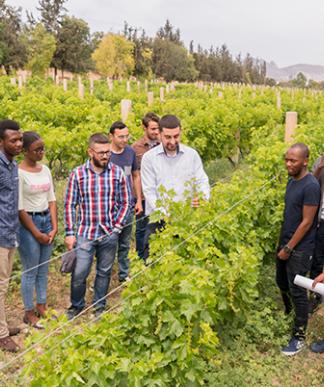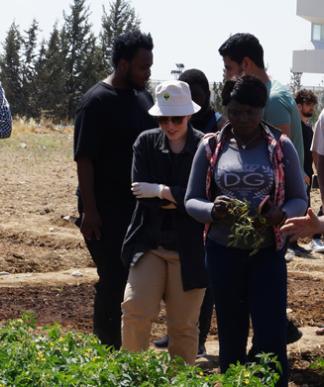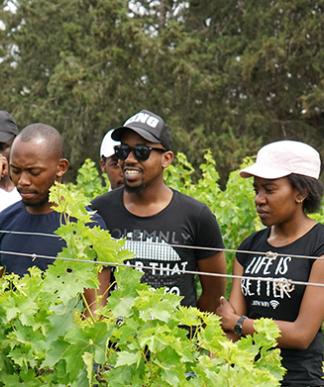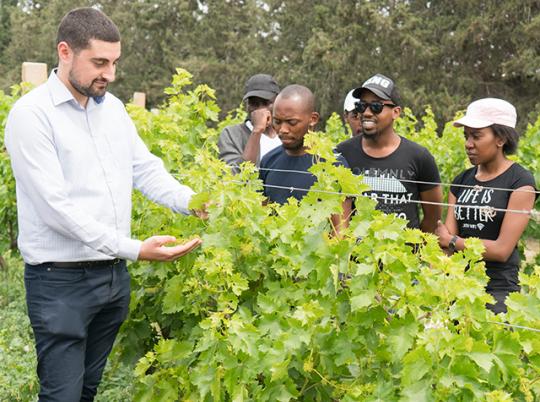Plant Production and Technologies



About the Department
Courses offered by the Department of Plant Production and Technologies include Mathematics, Biology, Chemistry, Agricultural Ecology, Meteorology, Soil Knowledge, Planting, Soil Productivity, Principles of Fruit Production, Garden Plant Breeding, and Developing Grain Suitable for Cool Climates. The Department provides a setting for the practical applications of these courses. In addition, Bio-production students help producers examine productivity.
Educational Opportunities
Department students have the opportunity to undertake research, to become part of applied education, and to have the opportunity to be interns in the 29,400 acre Practice, Research and Training Farm near the CIU campus, which includes 6550 acres of farmland, 4200 acres of olive trees, 750 of various fruit trees and 1600 acres of vineyard. 450 acres are for greenhouse cultivation and 250 acres are for open vegetable cultivation. Arable crops such as clover are planted in 20,300 acres and poultry husbandry is carried out in 1000 acres with sheep, goat, and cattle farming occupying 850 acres of land.

Career Areas
Graduates are expected to work as directors or technicians in multinational or international companies. They are able to start up and manage plant and animal production companies, or undertake private and formal studies. They may have careers in agencies that provide education and extension services; consulting companies; control-certification; project design and management; agricultural product and input marketing; retail industry; tourism; processing, wrapping, storing and transporting agricultural products; municipalities and marketplaces, production of seeds, seedling and saplings, egg production and breeding materials and in agriculture. Graduates are expected to be able to set up their own business effectively as a result of the improvement of their personal and entrepreneurship skills developed during their studies.
Contact
Faculty of Agricultural Sciences and Technologies
Graduate Sciences and Education Center, GE126
Tel: +90 392 671 1111 Extension: 2391
Faculty E-mail: secretary-foa@ciu.edu.tr
Head of Department: Prof. Dr. Ahsen Işık ÖZGÜVEN
Head of Department E-mail: aozguven@ciu.edu.tr
Compulsory Courses
First Semester
READING AND WRITING SKILLS-I
Course code
ENGL141Credit
3Theoretical
2Practical
2Ects
4HISTORY OF CIVILIZATION
Course code
HIST100Credit
0Theoretical
2Practical
0Ects
2INTRODUCTION TO COMPUTERS
Course code
ITEC110Credit
3Theoretical
2Practical
2Ects
4BASIC MATHEMATICS
Course code
MATH107Credit
3Theoretical
3Practical
0Ects
3BOTANY
Course code
PSCT101Credit
3Theoretical
2Practical
2Ects
5HISTORY OF AGRICULTURE
Course code
PSCT103Credit
2Theoretical
2Practical
0Ects
4METEOROLOGY
Course code
PSCT105Credit
3Theoretical
3Practical
0Ects
5MODERN TURKISH HISTORY
Course code
TARH100Credit
0Theoretical
2Practical
0Ects
2TURKISH LANGUAGE
Course code
TREG100Credit
0Theoretical
2Practical
0Ects
2TURKISH
Course code
TURK100Credit
0Theoretical
2Practical
0Ects
2Second Semester
GENERAL CHEMISTRY
Course code
CHEM110Credit
4Theoretical
3Practical
2Ects
6AGRICULTURAL ECONOMICS
Course code
ECON110Credit
3Theoretical
2Practical
2Ects
5READING AND WRITING SKILLS-II
Course code
ENGL142Credit
3Theoretical
2Practical
2Ects
4INTRODUCTION TO AGRICULTURE
Course code
PSCT100Credit
2Theoretical
2Practical
0Ects
3PLANT SYSTEMATICS
Course code
PSCT102Credit
2Theoretical
2Practical
0Ects
4AGRICULTURAL ECOLOGY
Course code
PSCT104Credit
3Theoretical
2Practical
2Ects
5SURVEYING TECHNIQUE
Course code
PSCT108Credit
3Theoretical
3Practical
0Ects
4Third Semester
GENETICS
Course code
BIOL203Credit
2Theoretical
2Practical
0Ects
3ACCOUNTING-I
Course code
BUSN211Credit
3Theoretical
3Practical
0Ects
5BIOCHEMISTRY
Course code
CHEM213Credit
3Theoretical
3Practical
0Ects
4MARKETING
Course code
EASC331Credit
3Theoretical
3Practical
0Ects
3SOIL SCIENCE
Course code
PSCT205Credit
3Theoretical
2Practical
2Ects
5PRACTICE AND ETHICS IN AGRICULTURE
Course code
PSCT209Credit
3Theoretical
2Practical
2Ects
5STATISTICS
Course code
STAT203Credit
3Theoretical
3Practical
0Ects
5Fourth Semester
PLANT NUTRITION
Course code
PSCT202Credit
3Theoretical
2Practical
2Ects
4PRINCIPLES OF VEGETABLE GROWING
Course code
PSCT206Credit
3Theoretical
2Practical
2Ects
5PRUNING AND GRAFTING TECHNIQUES
Course code
PSCT208Credit
3Theoretical
2Practical
2Ects
5AGRICULTURAL IRRIGATION AND DRAINAGE
Course code
PSCT210Credit
2Theoretical
2Practical
0Ects
4PRINCIPLES OF FIELD CROP PRODUCTION
Course code
PSCT212Credit
3Theoretical
2Practical
2Ects
4AREA ELECTIVE
Course code
PSCTXX1Credit
3Theoretical
3Practical
0Ects
4UNIVERSITY ELECTIVE
Course code
UNIEXX1Credit
3Theoretical
3Practical
0Ects
4Fifth Semester
FLORICULTURE
Course code
PSCT301Credit
3Theoretical
2Practical
2Ects
6ANIMAL HUSBANDRY
Course code
PSCT303Credit
3Theoretical
2Practical
2Ects
5PLANT PHYSIOLOGY
Course code
PSCT305Credit
3Theoretical
3Practical
0Ects
6AGRICULTURAL MECHANIZATION
Course code
PSCT307Credit
3Theoretical
2Practical
2Ects
4TROPICAL AND SUBTROPICAL CROPS
Course code
PSCT309Credit
2Theoretical
2Practical
0Ects
4POSTHARVEST PHYSIOLOGY
Course code
PSCT311Credit
3Theoretical
2Practical
2Ects
5Sixth Semester
ORGANIC FARMING
Course code
PSCT302Credit
3Theoretical
2Practical
2Ects
5OPEN FIELD VEGETABLE PRODUCTION
Course code
PSCT304Credit
3Theoretical
2Practical
2Ects
5AGRICULTURAL EXTENTION AND COMMUNICATION
Course code
PSCT306Credit
2Theoretical
2Practical
0Ects
3TEMPERATE ZONE FRUITS
Course code
PSCT308Credit
3Theoretical
2Practical
2Ects
5FEEDS AND ANIMAL NUTRITION
Course code
PSCT310Credit
3Theoretical
2Practical
2Ects
5AREA ELECTIVE
Course code
PSCTXX2Credit
3Theoretical
3Practical
0Ects
4AREA ELECTIVE
Course code
PSCTXX3Credit
3Theoretical
3Practical
0Ects
3Seventh Semester
SUMMER TRAINING
Course code
PSCT300Credit
0Theoretical
0Practical
0Ects
6SMALL FRUITS
Course code
PSCT401Credit
3Theoretical
3Practical
0Ects
5SOILLESS CULTURE
Course code
PSCT403Credit
3Theoretical
3Practical
0Ects
5ENTOMOLOGY
Course code
PSCT405Credit
2Theoretical
2Practical
0Ects
3DISEASES OF FIELD CROPS
Course code
PSCT407Credit
2Theoretical
2Practical
0Ects
3PROJECT MAKING
Course code
PSCT409Credit
3Theoretical
3Practical
0Ects
4UNIVERSITY ELECTIVE
Course code
UNIEXX2Credit
3Theoretical
3Practical
0Ects
4Eighth Semester
GENERAL PLANT BREEDING
Course code
PSCT402Credit
3Theoretical
2Practical
2Ects
5AROMATIC AND MEDICINAL PLANTS
Course code
PSCT404Credit
3Theoretical
2Practical
2Ects
5DISEASES OF HORTICULTURAL PLANTS
Course code
PSCT406Credit
2Theoretical
2Practical
0Ects
3VEGETABLE BREEDING
Course code
PSCT408Credit
3Theoretical
2Practical
2Ects
5CEREALS
Course code
PSCT410Credit
3Theoretical
2Practical
2Ects
3GRADUATION PROJECT
Course code
PSCT412Credit
2Theoretical
2Practical
0Ects
5AREA ELECTIVE
Course code
PSCTXX4Credit
3Theoretical
3Practical
0Ects
4Elective Courses
EXPERIMENTAL DESIGN
Course code
PST315Credit
3Theoretical
3Practical
0Ects
3PRINCIPLES OF FRUIT GROWING
Course code
PSCT204Credit
3Theoretical
2Practical
2Ects
4POULTRY SCIENCE
Course code
PST414Credit
3Theoretical
3Practical
0Ects
4INDOOR AND OUTDOOR ORNAMENTAL PLANTS
Course code
PSCT314Credit
3Theoretical
3Practical
0Ects
4PLANT TISSUE CULTURE TECHNIQUE
Course code
PST313Credit
3Theoretical
3Practical
0Ects
3PASTURE AND FORAGE
Course code
PST415Credit
3Theoretical
3Practical
0Ects
3TR Applicants
TR Students who are successful in the exams conducted by the Higher Education Council Student Selection and Placement Center (ÖSYM) and are entitled to enroll in our university in line with their preferences can complete the registration process with the necessary documents for registration from our Registration and Liaison Offices throughout Turkey or from the Marketing Directorate on campus.
Click for detailed admission requirements information.
TRNC Applicants
TRNC citizens and TR citizen candidate students who have completed their entire high school education in TRNC. They are placed in undergraduate programs in line with their success in the CIU Student Placement and Scholarship Ranking Exam and the programs they prefer.
Students who are successful in the exam can register from the TRNC Marketing Office.
Applicants can directly apply online to our undergraduate programs using the application portal. Please fill in your details correctly and upload all the required documents listed on the last page of the application form.
Required documents;
- Completed application form,
- Higher/Secondary Certificate or equivalents (e.g. O/A’Level, WAEC/NECO),
- Evidence of English Language competence: TOEFL (65 IBT) or IELTS (5.5). Students without these documents will take the CIU English proficiency exam on campus following arrival,
- Scanned copy of international passport/birth certificate,
- Fully completed and signed CIU Rules and Regulations document (which can be downloaded during the online application).
Graduates are expected to work as directors or technicians in multinational or international companies. They are able to start up and manage plant and animal production companies, or undertake private and formal studies. They may have careers in agencies that provide education and extension services; consulting companies; control-certification; project design and management; agricultural product and input marketing; retail industry; tourism; processing, wrapping, storing and transporting agricultural products; municipalities and marketplaces, production of seeds, seedling and saplings, egg production and breeding materials and in agriculture. Graduates are expected to be able to set up their own business effectively as a result of the improvement of their personal and entrepreneurship skills developed during their studies.
Tuition Fees are determined at the beginning of each academic year. Candidate students who are entitled to enroll in CIU can learn their fees in line with the Tuition Fee Calculation system.